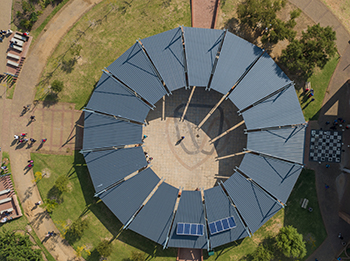Latest News Archive
Please select Category, Year, and then Month to display items
08 November 2024
|
Story Jacky Tshokwe
|
Photo Supplied
 The Kingdom Vision Foundation (KVF) management team took part in the annual Social Impact Innovation Awards organised by the SAB Foundation.
The Kingdom Vision Foundation (KVF) management team took part in the annual Social Impact Innovation Awards organised by the SAB Foundation.
In September, the Kingdom Vision Foundation (KVF) management team took part in the annual Social Impact Innovation Awards, organised by the SAB Foundation. This competition included a three-day workshop, during which participants received mentorship on enhancing their business models to maximise sustainable impact. Participants also crafted a four-minute business pitch, which they delivered to a panel of independent judges from sectors such as business, health, education, and government. At the end of the workshop, winners were chosen based on the impact of their innovation, the strength of their business model, and the likelihood of future success.
On 10 October, the management team attended the Innovation Awards Ceremony, where KVF was honoured with the Development Award worth R700 000. In addition to the grant, KVF will participate in a 15-month business coaching and mentorship programme in 2025, through which the SAB Foundation’s coaching team will support them in expanding and scaling their impact across South Africa.
The funding will enhance both the Kovsie Health and Anchor of Hope eye clinics, which are collaborating with the University of the Free State (UFS) Department of Optometry to provide affordable eye care to thousands of students and community members. The project aims to improve the quality of education for Optometry students, helping them experience the positive change they can drive through social impact. KVF’s vision includes a future at Kovsie Health where every student’s visual needs are met, regardless of financial constraints, and a thriving Anchor of Hope clinic that brings the gift of sight and renewed hope to rural communities around Bloemfontein.
Renewable energy systems an economical investment for the UFS
2017-06-14

The Qwaqwa Campus Arena equipped with freestanding
roof solar panels.
Photo: iFlair Photography
Renewable energy systems are said to be very expensive to implement initially, but in the long run they provide high economic returns.
With their decision to install renewable energy, the University of the Free State Department of Facilities Planning has now also adopted this innovative technology. They have chosen less capital-intensive solar power-generating options to generate electricity in various buildings and parking areas on all three UFS campuses.
“As per the UFS Energy Management Policy, all designs incorporate efficient, renewable energy sources varying from LED lights to solar power,” says Anton Calitz, Electrical Engineer in University Estates’ Department of Facilities Management.
South Campus taking the lead in renewable energy usage
In December 2016, a total of 26 solar-driven LED street-light poles were installed at the recently built Legae Residence’s parking area and the perimeter security area on the South Campus. This low-maintenance system improves security after dark and is independent of the national power supply, which is an important advantage during power outages. With no requirements for major earthworks and cable setting, operational costs are reduced.
The recently built infrastructure also takes pride in being the first to have a greywater system installed. This system will also be installed at three other residences on the Bloemfontein Campus in 2017. Greywater is made up of bath, shower, and bathroom sink water. The water is reused for toilet flushing, as well as for irrigation purposes.
Various UFS electrical operations to depend on solar power
On the Bloemfontein and Qwaqwa Campuses, the computer laboratories as well as the Thakaneng Bridge Student Centre and the projected Afromontane Research Centre will be equipped with freestanding roof solar solutions during 2017. These systems are designed to operate independently of the power grid (Eskom).
The systems only operate during sunlight hours when the PV solar panels are heated by the sun, making them suitable for operations such as ventilation fans, water pumps, and small circulation pumps for solar thermal water-heating systems.